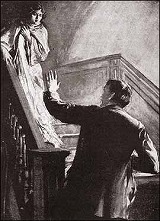“HAVE you seen all you want of the study?” asked White Mason as we reentered the house.
“For the time,” said the inspector, and Holmes nodded.
“Then perhaps you would now like to hear the evidence of some of the people in the house. We could use the dining room, Ames. Please come yourself first and tell us what you know.”
The butler’s account was a simple and a clear one, and he gave a convincing impression of sincerity. He had been engaged five years before, when Douglas first came to Birlstone. He understood that Mr. Douglas was a rich gentleman who had made his money in America. He had been a kind and considerate employer - not quite what Ames was used to, perhaps; but one can’t have everything. He never saw any signs of apprehension in Mr. Douglas: on the contrary, he was the most fearless man he had ever known. He ordered the drawbridge to be pulled up every night because it was the ancient custom of the old house, and he liked to keep the old ways up.
Mr. Douglas seldom went to London or left the village; but on the day before the crime he had been shopping at Tunbridge Wells. He (Ames) had observed some restlessness and excitement on the part of Mr. Douglas that day; for he had seemed impatient and irritable, which was unusual with him. He had not gone to bed that night; but was in the pantry at the back of the house, putting away the silver, when he heard the bell ring violently. He heard no shot; but it was hardly possible he would, as the pantry and kitchens were at the very back of the house and there were several closed doors and a long passage between. The housekeeper had come out of her room, attracted by the violent ringing of the bell. They had gone to the front of the house together.
As they reached the bottom of the stair he had seen Mrs. Douglas coming down it. No, she was not hurrying; it did not seem to him that she was particularly agitated. Just as she reached the bottom of the stair Mr. Barker had rushed out of the study. He had stopped Mrs. Douglas and begged her to go back.

“For God’s sake, go back to your room!” he cried. “Poor Jack is dead! You can do nothing. For God’s sake, go back!”
After some persuasion upon the stairs Mrs. Douglas had gone back. She did not scream. She made no outcry whatever. Mrs. Allen, the housekeeper, had taken her upstairs and stayed with her in the bedroom. Ames and Mr. Barker had then returned to the study, where they had found everything exactly as the police had seen it. The candle was not lit at that time; but the lamp was burning. They had looked out of the window; but the night was very dark and nothing could be seen or heard. They had then rushed out into the hall, where Ames had turned the windlass which lowered the drawbridge. Mr. Barker had then hurried off to get the police.
Such, in its essentials, was the evidence of the butler.
The account of Mrs. Allen, the housekeeper, was, so far as it went, a corroboration of that of her fellow servant. The housekeeper’s room was rather nearer to the front of the house than the pantry in which Ames had been working. She was preparing to go to bed when the loud ringing of the bell had attracted her attention. She was a little hard of hearing. Perhaps that was why she had not heard the shot; but in any case the study was a long way off. She remembered hearing some sound which she imagined to be the slamming of a door. That was a good deal earlier - half an hour at least before the ringing of the bell. When Mr. Ames ran to the front she went with him. She saw Mr. Barker, very pale and excited, come out of the study. He intercepted Mrs. Douglas, who was coming down the stairs. He entreated her to go back, and she answered him, but what she said could not be heard.
“Take her up! Stay with her!” he had said to Mrs. Allen.